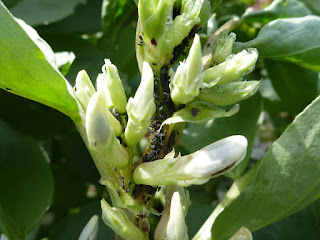Blackfly Arrives
Blackfly (or the 'Black Army', as Walt so eloquently describes them) have descended on the allotment in the last couple of weeks. Most people's broad beans are showing signs of infestation, ours included.
Although commonly known as Blackfly, the insects are actually a species of black sap-sucking aphid, also known as the black bean aphid. Many plants are attacked by aphids, but usually the damage is minimal. Unless the attack is really severe the best thing to do is be patient, let nature take its course and solve the problem for you.
The aphids produce a sticky substance on the plant leaves, known as honeydew. This attracts the predators - ladybirds, lacewings, hoverflies and parasitic wasps - which feast on the aphids, and will then stay around to control other pest attacks on your allotment.
However, heavy infestation of aphids can cause a lot of damage. You can rub them off with your fingers or remove infested leaves. Remove the tips of broad beans as soon as they become infested. A soapy spray will also work, but do check for lacewings or other aphid predators first. Never use insecticides when the plants are in flower as this endangers bees and other pollinators.
Nasturtium is a good companion plant for control of blackfly, so grow some on your plot to attract them away from your vegetables.
Although commonly known as Blackfly, the insects are actually a species of black sap-sucking aphid, also known as the black bean aphid. Many plants are attacked by aphids, but usually the damage is minimal. Unless the attack is really severe the best thing to do is be patient, let nature take its course and solve the problem for you.
The aphids produce a sticky substance on the plant leaves, known as honeydew. This attracts the predators - ladybirds, lacewings, hoverflies and parasitic wasps - which feast on the aphids, and will then stay around to control other pest attacks on your allotment.
However, heavy infestation of aphids can cause a lot of damage. You can rub them off with your fingers or remove infested leaves. Remove the tips of broad beans as soon as they become infested. A soapy spray will also work, but do check for lacewings or other aphid predators first. Never use insecticides when the plants are in flower as this endangers bees and other pollinators.
Nasturtium is a good companion plant for control of blackfly, so grow some on your plot to attract them away from your vegetables.
Submitted by Tigger

Comments
Post a Comment